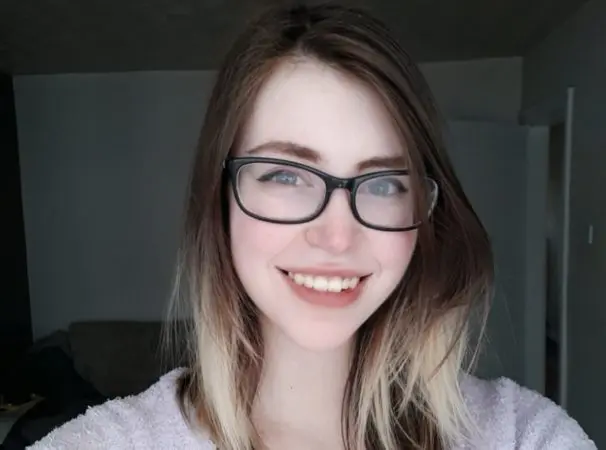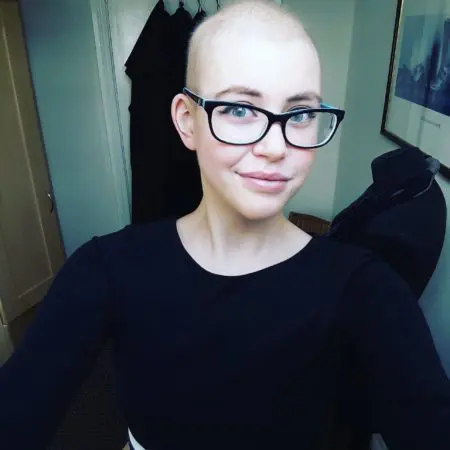Nísa’s story: “my experiences come with a degree of isolation”
This Pride Month, Nísa, 22, from Northern Ireland, is sharing her story and cancer journey. Here Nísa writes in her own words...
“It’s Pride month, and I’m really excited to have been given the opportunity by Young Lives vs Cancer to share my story! My name is Nísa, and I’m a 22-year-old from Northern Ireland. When I was 17 and working on my A-levels, I was diagnosed with stage 4 Non-Hodgkin’s lymphoma, which complicated my education quite a bit. I can no longer follow the career path I originally hoped for, but I have managed to carve out a different path and I now work freelance as an artist! I’m also LGBTQA+, and specifically I am queer and asexual.
Being told that I had cancer was pretty surreal, although my reaction wasn’t what anyone expected – I had been struggling with my mental health up until that point, and everyone expected me to shut down at such bad news, but it was the opposite. From the start, we all did our best to focus on what needed to be done to cure it, and positivity became a key player in my journey. But, naturally, it was hard for all of us, and especially my parents. We were all there together when we were told the news, but by then it had already been suggested that was what they thought was going on and I had already had a biopsy, so we had a bit of time to prepare.
I was diagnosed officially on June 1st, 2016, after my lung collapsed while I was in class. In hindsight, I know now that I had been ill for a very long time, but we didn’t recognise the symptoms as anything abnormal. My largest tumour (the one that caused my lung to collapse) was 12cm in diameter, but I had cancer in six different places around my body. My treatment plan was initially six cycles of R-CHOP chemotherapy and then possible radiotherapy, but that was expanded once we learned that I had cancer on my kidney.
I ended up having six rounds of R-CHOP, six rounds of intrathecal methotrexate (intrathecal chemo being given into my spine, as the kidney involvement meant it was at an increased risk of spreading to my central nervous system), 15 rounds of radiotherapy to the tumour in my chest, and then a further three rounds of methotrexate (intravenous this time).
On February 9th, 2017, I was told I was officially cancer free. My parents and I went up for the consultation and as we were walking to the consultation room, my nerves were clearly showing on my face as my consultant told me before we even got to the room. With my parents sitting there too, we got the news that I was cancer free, and I have never felt so much relief in my life. It also felt a bit strange to go from my day-to-day existence focused almost entirely on treatment, to suddenly not having something specific to focus on. It took a little while for the news to really sink in, but in February of 2022, I will officially be five years cancer free.
Young Lives vs Cancer have been amazing for my family, right from the beginning. I was assigned a social worker from the charity and my family were also offered support in various ways. Young Lives vs Cancer helped me deal with the uncertainty of my education, and then after I was cancer free, learning to navigate that area again. I’ve been to workshops where I can socialise with other young cancer patients, and for me that’s really important – cancer is a very isolating experience, but especially as a young person. Having these workshops and other opportunities to connect with other young people facing cancer has been really important to me.
Although I try not to let my cancer diagnosis define who I am, it’s an integral part of me now – I grew a lot from it and learned a lot from it. One of the other really integral parts of who I am is my identity as an LGBTQA+ person.
As I said previously, I am a queer asexual person, and both of these labels are important to me for different reasons. Pride month is important to me because it provides LGBTQA+ people with a platform that may not be available the rest of the year. It gives us a platform to help educate others on our history and reach out to other queer people – including those who may be closeted, or otherwise prefer to celebrate Pride month quietly – and it gives us an opportunity to have our voices heard.
On a more individual basis, it’s important to me to have this sense of community. As an ace person, although I try my best to spread positivity and to feel proud of being asexual, it creates a number of challenges for me. I sometimes find myself feeling like I am broken or like something is wrong with me, and this isn’t an uncommon experience among asexual people, either. Pride month is important to me for reaching out to other people with the same experiences and as a community being able to support one another, share our experiences, and see that we aren’t alone – no matter how isolating things can feel, sometimes.
For me, Pride month is a time to connect with other people. I am proud of my identity, but sometimes it can feel isolating, and Pride month is a time for me to reach out to others who might feel similarly and remind them that we’re in this together.
Both my experiences as an LGBTQA+ person and my experiences as a young person with cancer come with a degree of isolation, but Young Lives vs Cancer has given me the opportunity to connect with other young people in similar circumstances and that’s something I really cherish.”
Nísa will be doing an Instagram Takeover of the Young Lives vs Cancer Instagram account on Friday 25th June from 12pm to 2pm. Be sure to head on over!
Posted on Tuesday 22 June 2021



